Canada’s WestJet Group Chief Executive Officer has addressed the airline’s ambitions to achieve net-zero emissions by 2050, at the World Petroleum Congress in Calgary.
Alexis von Hoensbroech outlined the vital role sustainable aviation fuel (SAF) plays in the future of decarbonizing aviation, and Canada’s unique placement for SAF production.
The SAF Imperative
The aviation industry faces a unique challenge in its quest for sustainability. Unlike other modes of transportation, there is currently no feasible technological alternative for large commercial aircraft propulsion.
This is where the significance of sustainable jet fuel becomes evident. To decarbonize aviation effectively, the industry must turn to SAF as a foundational solution.
SAF stands out as the most effective way to reduce the carbon footprint of air travel. It has the potential to almost entirely eliminate net greenhouse gas emissions compared to traditional fossil jet fuel.
The beauty of SAF lies in its compatibility with existing aircraft and infrastructure. It can be seamlessly blended with conventional jet fuel, meeting all certification and safety requirements.
This makes it a practical and immediate solution to reduce greenhouse gas emissions from air travel without necessitating costly investments in new aircraft engines or fuel distribution processes.
[monsterinsights_popular_posts_inline]

Canada’s Unique Advantage
Canada, with its vast landscape and robust oil and gas industry, is uniquely positioned to play a pivotal role in the large-scale production of SAF.
The country has ample space to cultivate the necessary feedstock for SAF production. Moreover, Canada boasts ambitious federal sustainability goals that align perfectly with the aviation industry’s decarbonization efforts.
Alexis von Hoensbroech, WestJet Group Chief Executive Officer, emphasizes, “Air travel is essential to Canadians and critical to the nation’s economy.”
Indeed, Canada recognizes the importance of a thriving aviation sector. To achieve this while staying true to sustainability goals, Canada needs to create the right regulatory environment and foster collaborative efforts between producers and airlines.
The Need for a Regulatory Framework
The time is ripe for Canada to establish a comprehensive regulatory framework that encourages investment in sustainable aviation fuel production.
Such a framework would not only bolster Canada’s position as a global leader in energy sustainability but also ensure that air travel remains affordable and accessible to all Canadians.
One of the key challenges hindering the widespread adoption of SAF is its cost, which can be up to three to five times that of traditional jet fuel.
To date, not a single drop of SAF has been produced in Canada. Collaboration between airlines, producers, and policy makers is the path forward to address this challenge.
By working together, these stakeholders can drive down costs and make SAF the low carbon fuel standard for the aviation industry.
WestJet Group’s Commitment
The WestJet Group, with one of North America’s youngest and most fuel-efficient fleets, is fully committed to this cause.
As the largest consumer of jet fuel in Alberta, the WestJet Group understands the imperative of creating a competitive investment climate for SAF production. They firmly believe that this is the key to safeguarding a decarbonized future for Canadian aviation.

Click the banner to subscribe to our weekly newsleter.









